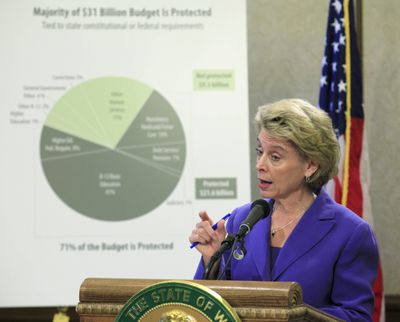Gregoire offers initial budget
She’ll seek new revenue later to save programs

OLYMPIA – Making her case for tax increases, Gov. Chris Gregoire on Wednesday presented a bleak plan to balance the state budget by wiping out spending for health care, welfare and education programs – but vowed to restore some of that money in January.
As required by law, Gregoire presented a plan for balancing the state’s $2.6 billion budget deficit using only the state’s existing tax streams.
But in an open letter to Washingtonians, the second-term Democrat also said she can’t let those deep spending cuts stand. She plans to roll out a second budget proposal early next year when state lawmakers start balancing the books.
That second budget still will cut spending by about $1 billion, she said, but also will propose additional revenue to rescue about $700 million worth of programs from the chopping block. The balance would come from reserves and other one-time sources.
Programs likely to be restored in her second budget included:
The Basic Health Plan, which provides subsidized health coverage to about 65,000 low-income Washingtonians.
General Assistance, a state welfare program for people with disabilities who can’t work or qualify for federal disability payments.
Levy equalization, a system that gives money to school districts with lower-than-average property tax bases.
While Gregoire did not propose a specific way to finance those programs, she didn’t rule out an increase of the state’s 6.5 percent sales tax.
“These important and integral services do not come free,” Gregoire said. “No one likes to pay more taxes. And no one likes to raise more taxes, no matter the state of the economy.”
The decision to seek tax increases was not a surprise. Gregoire spoke repeatedly in recent weeks about her unwillingness to run with an all-cuts budget. But the move carries some political risks for the Legislature’s Democratic majority going into an election year.
Raising taxes would require changes to Initiative 960, the voter-approved tax-limiting measure passed in 2007. That initiative effectively kept a lid on any tax plans during the last legislative session, but a two-year ban on amending its terms expires this month.
After that, the Legislature can amend the initiative with a simple majority vote. Democrats have enough votes to take that step on their own, although threats to a rural-serving program like levy equalization could attract some Republican support.
“We would have to amend 960 immediately and the governor sign it before we could go ahead,” said Senate Ways and Means Chairwoman Margarita Prentice, D-Renton.
Republican lawmakers, however, said Democrats were reaching for revenue too quickly. They suggested alternatives that also would save or raise money, including reductions of state management staff and privatization of the state monopoly on liquor sales.
“In essence, the governor is saying that state government won’t live within its means even though the economy is forcing families and businesses to live within their much-reduced means,” said Rep. Ed Orcutt, R-Kalama.